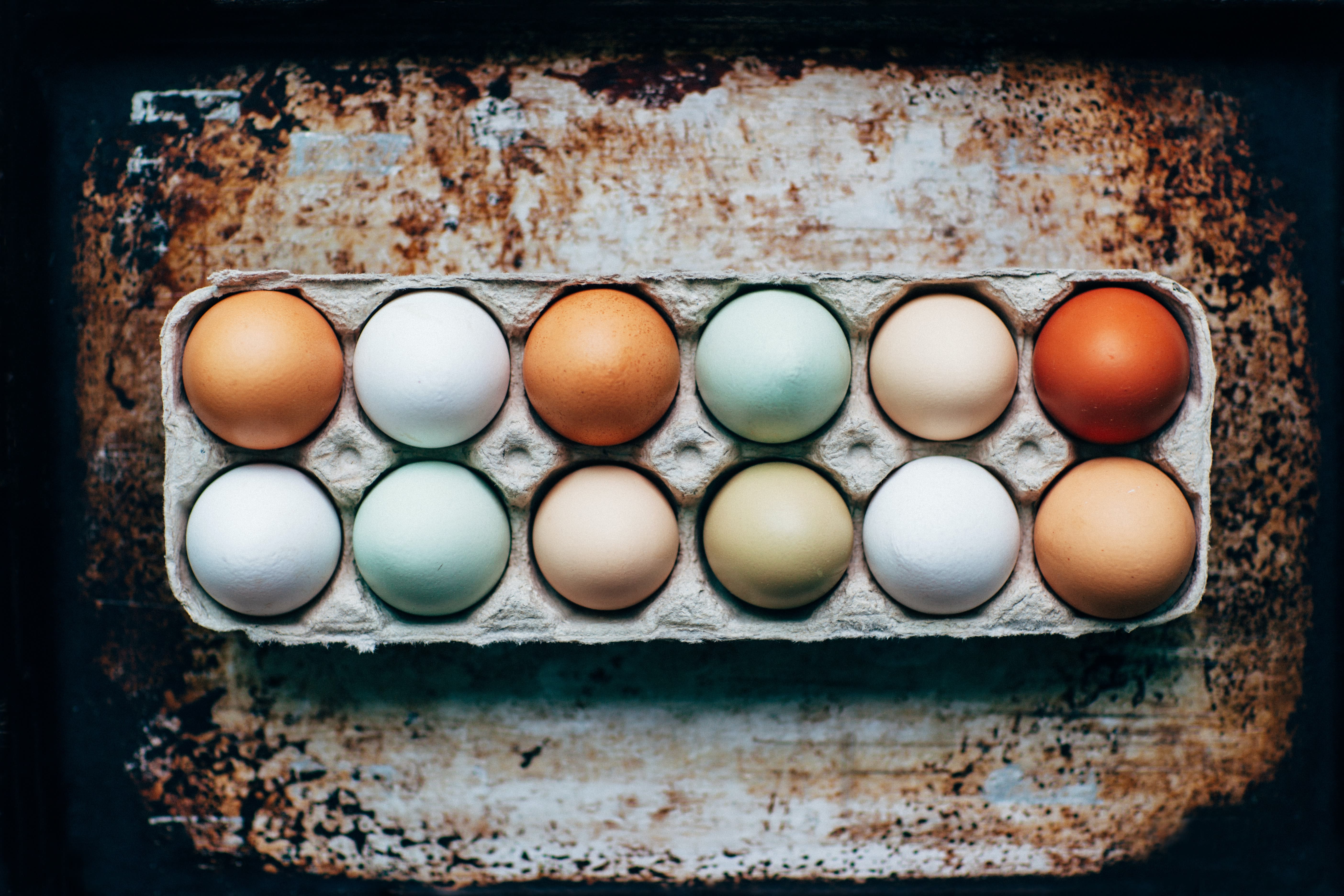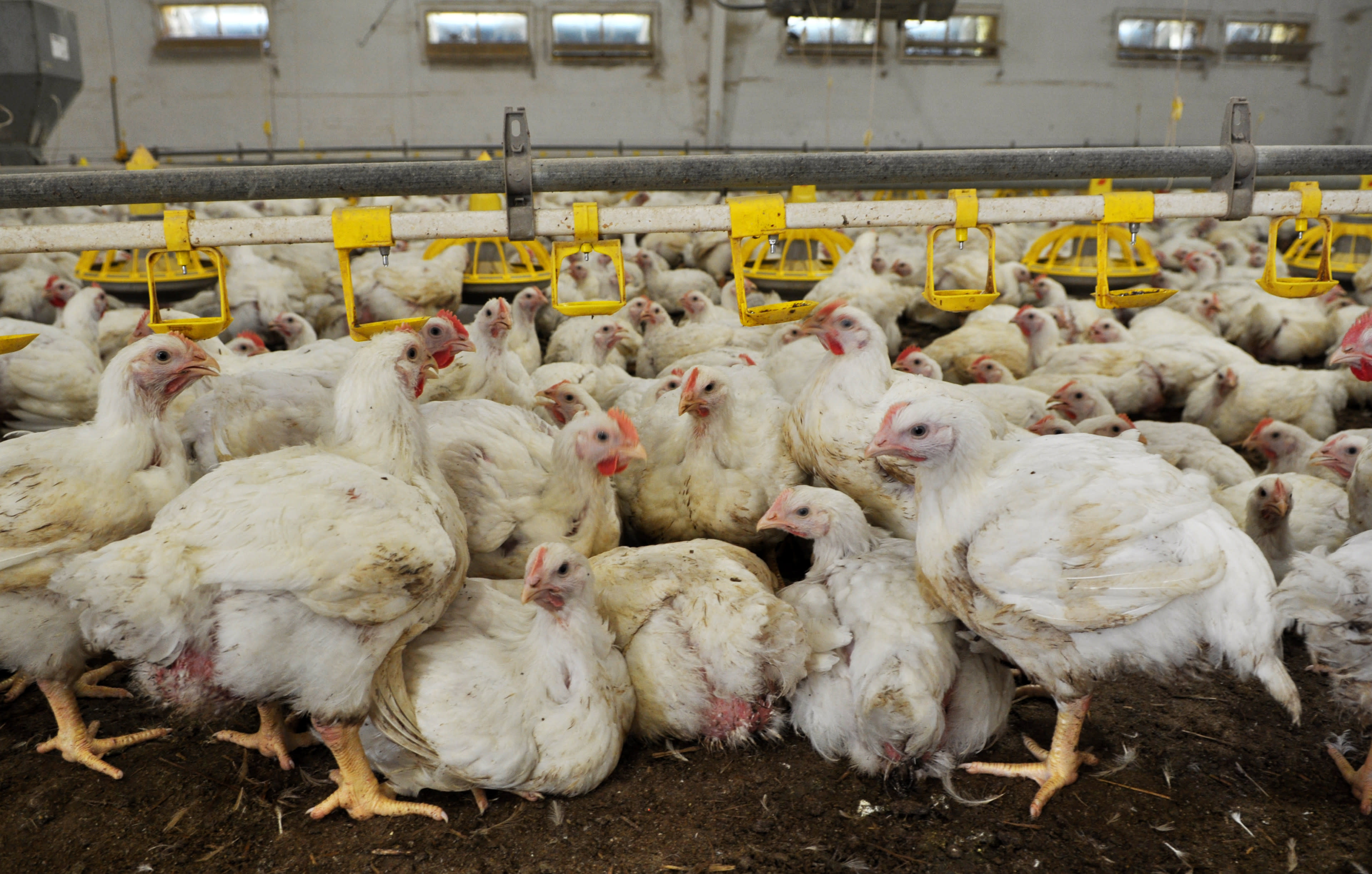




All the facts about egg farming in the UK.

When it comes to giving up certain foods because of our love for animals, forgoing meat and dairy can seem obvious, because the suffering they cause is obvious.
But what about eggs? Hens lay eggs naturally - or so many people think - making the problems with their production difficult to spot.
But like with most other types of animal products, eggs too are produced via factory farming and come with an abundance of animal welfare concerns. In fact, there’s nothing natural about how factory-farmed eggs are produced, including in the UK.
How are eggs produced in the UK?
Around 35% of eggs sold in the United Kingdom are produced via factory farming, and that percentage gets even higher if you consider that bird-flu increasingly means that free-range flocks have to be moved in to closed barns. Thankfully, old-fashioned barren battery cages have been banned in the UK and EU.
Despite this ban, a significant number of hens still spend their lives in cages, deemed “enriched”, because they offer the birds only slightly better conditions. On these factory farms, it is still common to see birds without feathers, birds who are diseased, and even dead hens being trampled upon by others.
And for the hens who are not housed in cages, but rather living “free-range”, there are rarely rolling green pastures, as adverts would have us believe.
Without the right outdoor environment, and plentiful access routes, hens can find themselves 'stuck' inside large sheds with the lights on for about 16 hours a day, for most of the year. This manipulation of light compels the hens to lay the maximum number of eggs possible. Then, after about a year when their production starts to slow down, they are sent to slaughter.
How many commercial laying hens exist in the UK?
As of 2023, there were 38 million laying hens in the UK. That number can fluctuate year to year based on a variety of factors, including a particularly significant one: avian flu, which has been spreading globally in recent years, leading to millions of birds being culled.
What do egg-laying hens eat?
Laying hens eat a specifically formulated diet that’s high in protein and calcium. The calcium is included to support their bones and egg production, but most hens still develop bone fractures or osteoporosis.
Where do laying hens lay their eggs?
Hens in the UK have access to nesting boxes, in which they can lay their eggs with a little bit of privacy. Usually these have a wire floor, and hanging plastic flaps to create some darkness.
What happens to male chicks in the egg industry?
One of the most pressing welfare concerns in egg farming in the UK, and beyond, is the mass culling of male chicks immediately after hatching. This is done because male chicks cannot lay eggs and are thus considered unusable industry byproducts.
How many eggs are laid by hens in the UK each year?
Commercial hens lay more than 300 eggs per year each, thanks to generations of intensive breeding. Their closest wild relative - the Red Jungle Fowl - lay only 10-15 eggs per year.
What are the four types of egg farming in the UK?
Labels on egg cartons can be confusing, but all eggs in the UK are produced using one of four methods. If your eggs are laid by hens in the UK, they’ll be from hens in one of the following categories.
It's worth remembering though, there are no laws in the UK against importing eggs from chickens kept in traditional battery cages in other countries.
Enriched colony cage production (28.2% of UK production)
Eggs laid by hens in enriched colony cage systems make up 28.2% of eggs produced in the UK. In these enriched cages, birds are offered a perch, nesting box, and a small scratch pad in order to exhibit some natural behaviours. However, these birds still are not given enough space to spread their wings, and spend their entire lives crammed together with other birds.
Free-range egg production (61.4% of UK production)
About 61% of the eggs produced in the UK are laid by hens living in free-range housing. Hens laying free-range eggs have access to the outdoors during the day with a maximum stocking density of 2,500 birds per hectare. In addition, they have access to a barn overnight.
Barn egg production (6.8% of UK production)
Barn or cage-free eggs make up 6.8% of eggs produced in the UK. While barn housing - in which hens are packed into a barn but are not in cages - offers a small improvement over enriched cages, overcrowding can still lead to aggressive behaviours like feather pecking.
Organic egg production (3.7% of UK production)
Laying 3.7% of British eggs, organic hens have free range of both indoor and outdoor spaces. The allowable stocking density on organic farms is also the lowest, at six hens per square metre.
How does offering outdoor space affect the welfare of hens?
When birds have access to the outdoors, stocking densities tend to be lower, meaning that there’s a lower incidence of pecking and cannibalisation. When they have more space and access to the outdoors, hens also express more natural behaviours.
How to tell if eggs are organic, free-range, or otherwise
Eggs from organic, free-range, or barn production systems are likely to be marked as such. If a package of eggs is not clearly marked then they’re most likely from hens kept in cages.
In addition, eggs sold in supermarkets are stamped with the producer’s code. So, open the box and look inside for a stamp on the shell of the eggs to find out more. The first number of the code indicates what type of housing the hens are kept in: 0 for organic, 1 for free-range, 2 for barn, and 3 for enriched cage.
What happens once eggs are collected?
In the UK, eggs are not washed or cleaned at any point during processing. They are sorted by quality, with Grade A eggs going onto stores, while lower grades are used to make other products. This lack of washing leaves the delicate outer protective layer, called the bloom, intact.
In other countries, such as the United States, eggs have to be cleaned before they can be sold, removing this bloom and thus requiring the eggs to be refrigerated.
How many eggs are eaten in the UK each year?
People in the UK consumed 12.59 billion eggs in 2022. That equates to roughly 187 eggs per person.
What is the value of the egg industry to the UK economy?
The retail value of all those eggs is £1.3 billion. Most eggs - about 65% - are sold directly to consumers via retail. However, another sizable chunk - 16% - is served by restaurants and other food service establishments. The remaining 17% are utilised in manufacturing.
Are eggs healthy?
Despite being a staple in many kitchens, eggs can actually be a health risk. Aside from high levels of heart-clogging cholesterol, eggs can also contain dangerous bacteria which can land you in the bathroom, or even the hospital, with an uncomfortable or more serious case of food poisoning.
Does egg farming pose a risk to human health?
Egg farms are hotbeds for disease. For example, avian flu has been spreading around the world and has even been found in wild birds in the Antarctic. Some people who work directly with birds have also contracted the disease, and while for now human cases are rare, chicken farms provide the perfect environment for the disease to mutate to more easily spread among humans.
The bottom line
The best thing to do for hens is to stop eating eggs. Thankfully, swapping them out in baking and cooking is easier than most people think. If you’re not quite ready to give them up completely, choosing organic eggs is a good first step.
You can also support us as we fight to eliminate some of the worst suffering for hens across the UK.








